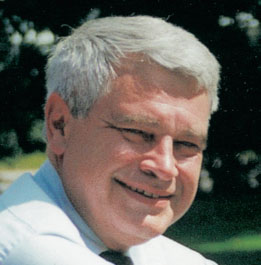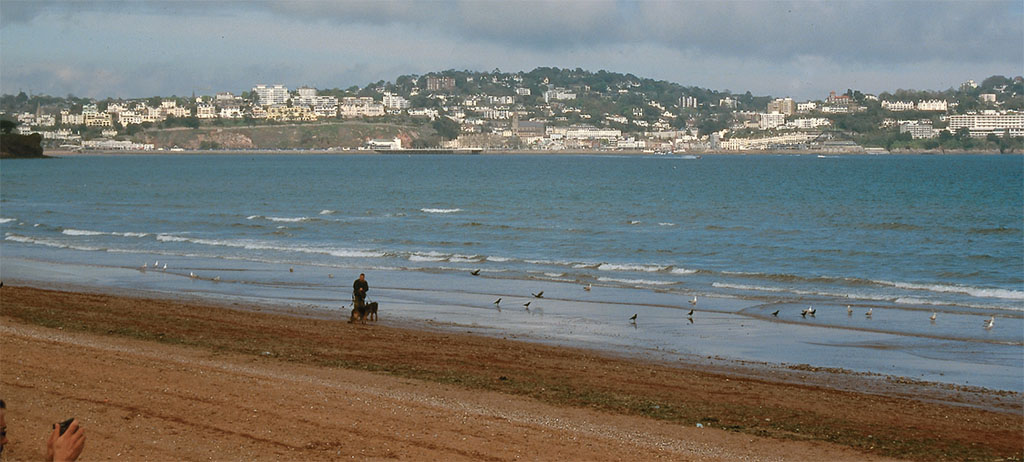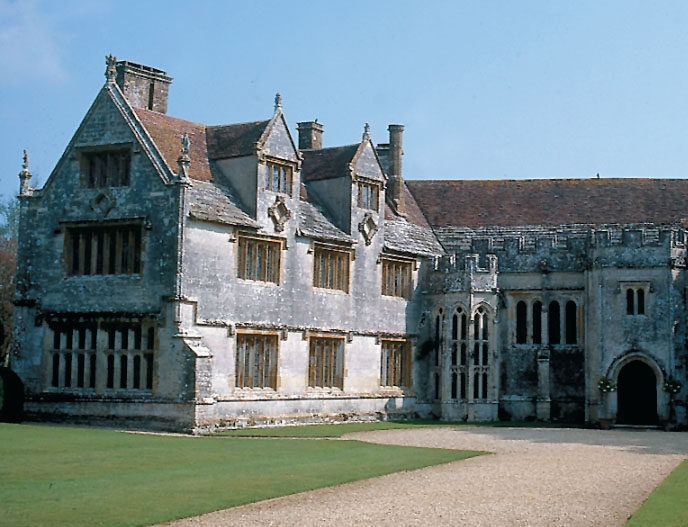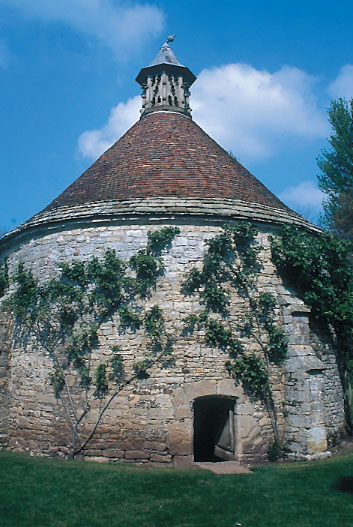
[caption id="SoComeAlongandLiveSomeHistory_img1" align="aligncenter" width="261"]

IF I HAD A POUND STERLING for every time someone had offered to go along and carry my bags on my British travels over the years… I would probably invest it in Tesco stock. Besides, long ago I learned to travel light.
Even without the bag-carrying detail, though, British Heritage readers have always enjoyed sharing the rambles that are one of the most enjoyable parts of editing this great magazine. So, once again, welcome along while we roam the sceptered isle.
After an early morning landing at Heathrow, it takes almost as much time to navigate to the car rental station as it does to travel in a 747 between New Jersey and Newfoundland. Soon enough, however, I joined the queue known as the M25 and headed for Devon. A good friend insists that he used to follow the same route, making the drive from Sevenoaks to Plymouth in three hours. Methinks the traffic was lighter when he did it, and the CCTV cameras fewer.
‘PUBS ARE WHERE IT IS NORMAL AND CUSTOMARY TO CONVERSE WITH STRANGERS—EVEN AMERICANS’
Down the A3 to the A303, the morning commute thinned out. It’s beautiful, rolling countryside across Hampshire and bits of Wiltshire and Somerset. The dual carriageway narrows to a meandering country road by the time it reaches Devon and becomes the A30 leading into Exeter. I had already been on the road three hours.
My destination was Tor Bay, the arching 22-mile coastline known as the English Riviera. I left the main road to follow the coast down through Dawlish and Teignmouth, where the main train line to Cornwall runs right along the water’s edge. Still, they’ve got some nerve terming the A379 an A road.
It was my intention to put up at Fawlty Towers in Torquay. Yes, fans, there is such a place, or at least the modest hotel that inspired John Cleese to create the famous series when he and the Monty Python crew were staying there doing some filming back in the 60s. As in the series, the hotel’s location is something other than prime, and I opted instead for the seafront. Of course, by then the skies were gray and drizzly, with a chill breeze off the Channel.
The results of my adventures in Tor Bay appear a few pages on. It was Agatha Christie, really, who drew me to the area, and the exciting opening of her holiday home, Greenway House, by the National Trust. That story will have to wait. I did, however, spend several nights at the Grand Hotel, where Agatha spent her honeymoon in 1914.
Fortunately, the weather broke while I was there and blue skies ascended. After all, it is tough to get bright photography against dark skies. Over the years, I have led many a garden tour to England through the spring. When the itinerary says it’s time to visit Stourhead, you go even in the rain. The only consolation I could offer was to remind folk that no one goes to Saudi Arabia to see the gardens.
One timely topic of conversation I ran into everywhere on this trip was the saddening closure of pubs. Admittedly, it was at pubs that the topic generally came up. I’ve always frequented pubs for two reasons. One is that, to borrow from Willie Sutton, that is where the beer is (real ale, please). The other is that pubs are where the people are. More pointedly, public houses are where it is actually normal and customary for Brits to have conversations with strangers, even Americans. It becomes far easier, understandably, when one knows the etiquette—buying your round, queuing properly for drinks, etc. And practicing the English custom of exchanging names at the end of conversations rather than the beginning: “By the way, my name is Dana.”
Everyone has a theory as to why the great British institution of the pub appears to be in precipitous decline. One significant factor is the present Government’s taxing policy, which has widened considerably the gap between what a tipple costs at the pub versus fetching same from the supermarket or off-license. Another is the draconian antismoking laws that have just taken the joy out of the pub for millions of puffing Brits. A third, of course, and one that has hit country pubs hardest, is that folk daren’t go out for the evening and have a few pints before driving home. If the coppers don’t catch you, those CCTV cameras will.
From Tor Bay, I turned east in the unseasonable sunshine, following the Devon coast to Dorset. I stopped and explored at Sidmouth and Lyme Regis and reached at last the Dorset county town of Dorchester, where the carbuncle of Prince Charles’ Poundbury development continues to spread west across the landscape. The population of Dorchester has doubled in the 30 years since I first hoofed around the heart of Thomas Hardy Country.
Fortunately, the downtown of Hardy’s Casterbridge remains largely unaltered and would still be recognizable to the poet and novelist, and to his characters. I put up at the King’s Arms—well-known to Hardy lovers, King George III and Princes William and Harry. Back when I first fell in love with Dorchester, I stayed in a rather grotty room up over a pub. Now it’s a computer store. Typical.
Across the street from the King’s Arms was a shop that reminded me again of the great English penchant for word play: Beds R Uzzzzz. Later, I would pass a beauty salon called Haircilucination. And a plant and flower shop named Back to the Fuchsia. Enough. Yes, it was Thomas Hardy who drew me back to Dorchester on this trip, but we’ll walk through Casterbridge in the next issue.
On a bright Sunday, I drove the eight miles down to Weymouth and the Isle of Portland. I paid a call at Portland Castle, one of Henry VIII’s perimeter forts that Sian Ellis wrote about in our July issue. The waterfront here is where the sailing and yachting events are going to be held in the 2012 London Olympics. In fact, it is the first Olympic venue that has been proclaimed completed. On this side of the pond, we don’t hear much about the games, still several years away. In Britain, however, preparations for the Olympics are in full force and in the news almost daily.
When those Olympics do come, of course, everyone rightly adjudges that London will be a madhouse and astronomically expensive. The sailing events in Portland Harbor, though, will be unticketed. Anyone can line up along Chesil Beach, the promontory of Nothe Fort or the Heights of Portland and watch the action. Psst. Wanna go to the Olympics for free? Skip London and head for the gorgeous countryside of Dorset.
I had yummy haddock and chips with not quite mushy peas at a place called Moby Dick’s (what else?) on the sandy beachfront of Weymouth. With full sunshine and temperatures approaching a thrilling 68 or 70 in mid-April, the beach was packed with revelers. Admittedly, not many folk were playing in the Atlantic waters, but paddle boats abounded in the harbor.
Heading east from Dorset, I stopped between Tolpuddle and Puddletown at Athelhampton House. Privately-owned and home to a young family with two small boys, Athelhampton rates as a first-class visit—justly describing itself as the quintessential English manor house. Apart from pristine and magnificent Tudor gardens, the house was a breath of refreshing air from the formality of such National Trust and English Heritage properties. It felt like a home. In the Great Hall, an affable and knowledgeable young lady took my ticket, invited me to wander at will, take pictures and sit on the furniture. The huge stone fireplace smelled of recent use. How delightful!
[caption id="SoComeAlongandLiveSomeHistory_img2" align="aligncenter" width="1024"]

DANA HUNTLEY
[caption id="SoComeAlongandLiveSomeHistory_img3" align="aligncenter" width="688"]

[caption id="SoComeAlongandLiveSomeHistory_img4" align="aligncenter" width="353"]

DANA HUNTLEY
It was with a certain amount of foreboding that I was headed toward London. No matter how much I love the city, after rambling around the green and pleasant land, London is always a bit of a jarring change. For a last night on the road I stayed in Midhurst, in the swathe of Sussex countryside designated to become Britain’s newest national park. I stayed at the Angel Hotel, whose roots go back to the days of medieval pilgrims, and wandered around the ruins of Cowdray Castle, painted by Constable and Turner.
That evening I took a pint or two at The Swan, its new publican hopeful that he could make it, while across the market square another pub had closed. At the tables outside, where my pipe and the smokers gathered, I visited with a delightful, erudite gent about the woes of the economy and British politics. We bought rounds and as he scuppered off to supper he proffered, “By the way, my name is Roger.”
Back in town the next day, I walked the Edge-ware Road from Marylebone to Marble Arch. Its length is now a Middle Eastern enclave, with Halal grocers and restaurants, women in burkhas, old men puffing on hookahs at café tables. There is a pub just a couple of blocks north of Oxford Street where a mate I knew used to work. I thought I’d stop in and see if he was still there. But newspapers and graffiti covered the windows. Old English Gentlemen was closed. Sadly ironic—and typical.





Comments